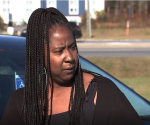Stress of serving on COVID frontlines led to EMT’s suicide, mother says
[ad_1]
When the coronavirus was rapidly spreading across the U.S. in April and May last year, paramedics in New York City on the frontlines of the pandemic responded to more than 7,000 calls a day. The calls kept coming, and EMTs kept answering.
What those EMTs saw is tough to shake. “You never had time to think,” said deputy chief A.J. Briones, of Empress Ambulance Services in Yonkers, N.Y. “Once it started slowing down, that’s when you actually had to worry.”
Worry, he said, about the toll on paramedics’ mental health. “PTSD is a rabbit hole; you get angry for no reason, you lose who you are. Part of it feels like you’re being a burden to someone else. Part of it is reliving those moments,” he told correspondent Mola Lenghi.
Eileen Mondello was an ICU COVID-19 nurse when she received a call that her 23-year-old son, John, an EMT, had taken his own life. “My son had dreams of a future, and that was taken by this pandemic,” she said.
John Mondello was fresh out of the EMT Academy when the pandemic hit. “He was sent to the busiest 911 call volume in the city,” said Eileen.
His mother says stress and anxiety consumed him.
Family Photo
Lenghi sat down with John’s partner, Delilah Woods; Shakira Tate; and Alexander Puszka to talk about the mental health of EMTs.
Woods said, “I think that realization of, ‘Yeah, I’m here to save lives. But I can’t save you,’ I didn’t realize how that affected me until very recently.”
“It’s sort of taboo to bring that up, I guess?” asked Lenghi.
“Right, exactly,” Puszka replied, “’cause, you know, the job wants you to be present. There’s definitely days where I didn’t sleep. There’s definitely days where I had dreams of people hanging themselves. I guess at one point I was having suicidal thoughts myself.”
Tate said, “I think we definitely do need a better support system that’s in place for all first responders, not only just for EMS.”
Lenghi asked New York Fire Department Lt. Krystal Hayes, an EMS peer support coordinator, “Does the FDNY have enough mental health resources in place?”
“I believe they have enough now, but to say that it’s enough for forever, no,” Hayes replied. “It’s an ongoing process.”
“Would it surprise you to hear that some EMTs say that more resources are needed?” Lenghi asked.
“No, not at all,” Hayes said. “Sometimes people need more than what we can provide, and then we can either outsource them to somebody that can help them better than what the department can.”
Deputy chief Briones said the strongest thing someone can do is ask for help: “It’s not a ‘been there, done that’ attitude,” he said. “It’s, ‘I’ve been there. I know how to help you.”
Eileen Mondello wants more counseling made available: “My biggest hope is that no mother should ever feel the way that I do,” she said.
Lenghi asked, “What would you say to mothers who have a son or a daughter who may be struggling right now?”
“I would say don’t take any change in personality for granted. If you see your son or daughter becoming anxious, act on it immediately,” she said. “If you’re wrong and you’re exaggerating, that’s okay, because once something like this happens, there’s no turning back.”
If you need immediate help, call the 24/7 National Suicide Prevention Lifeline, at 1-800-273-TALK (8255). It’s free and confidential.
FDNY offers a similar hotline to EMTs, and has a counseling services unit which provides a range of therapy options, for groups and individuals, giving them a chance to talk to current and retired members who can help.
[ad_2]
Source link











